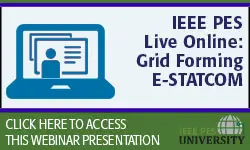Innovative Teaching Methods for Modern Power and Energy Systems (TR 120)
Jelena Ponocko, Carlo Alberto Nucci, Ahmed F. Zobaa, Masoud Davari, Pierluigi Siano, Rad Stanev, Jean Patric da Costa, King-Jet Tseng, Ferdinanda Ponci, Sukumar Kamalasadan, Lars Nordström, Georgios Konstantinou, Luke Dosiek, Junbo Zhao, Rui Bo, Charalambos Konstantinou, Christina Papadimitriou, Isabel Moreno-Garcia, Mazheruddin Syed, Antonello Monti, José María Maza-Ortega, Manuel Barragan Villarejo, Luiz Fernando Lavado Villa, Timothy Hansen, Ron Brandl, Yanli Liu, Ilka Jahn, David Laverty, José Luis Rueda Torres, Alexandros Chronis, Alexandros Paspatis, Sam Salem, Shady Abdel Aleem, Valentina Cecchi, Paras Mandal, Courtney Smith-Orr, Saeed Peyghami, Subham Sahoo, Frede Blaabjerg, Anurag Srivastava, Marco Jung, Hussain Syed Kazmi, Andreas Stavrou, Marios Kynigos, Georg Lauss, Olga Lavrova, Derk Gonschor, Mike Mekkanen, Panayiotis Moutis, Thomas Strasser, Qiuwei Wu
-
Members: FreePES
IEEE Members: $45.00
Non-members: $70.00Pages/Slides: 114
28 Mar 2024
The role of education and training is of great importance to be able to face the current and future challenges of the energy transition. The main goal of this document is to provide a systematic overview of innovative teaching methods and tools for power and energy systems, offering a benchmark for the academic community and aiming to serve as a reference for the coming years. It reports on new skills needed in the power and energy sector, identifies skill gaps and highlights the need for interdisciplinary approaches. Advanced educational methods are presented, such as active learning, problem-based, experiential learning and flipped classroom. Methods to assess the learning of the students and the teaching of the instructors are presented, along with results of an international survey launched by the Task Force. New trends in laboratory education, namely remote/virtual laboratories, real-time HIL simulation, real-life living labs and augmented/virtual reality, are presented through actual experiences. Αn overview of simulation tools and e-learning approaches is provided, such as interactive notebooks, open-source methods and blended learning. Recommendations for education and training on power and energy systems are provided. Additional information and specific applications are included in the Appendix.
Chairs:
Panos Kotsampopoulos, Nikos Hatziargyriou
Primary Committee:
Power and Energy Education Committee
Sponsor Committees:
Power and Energy Education Committee


